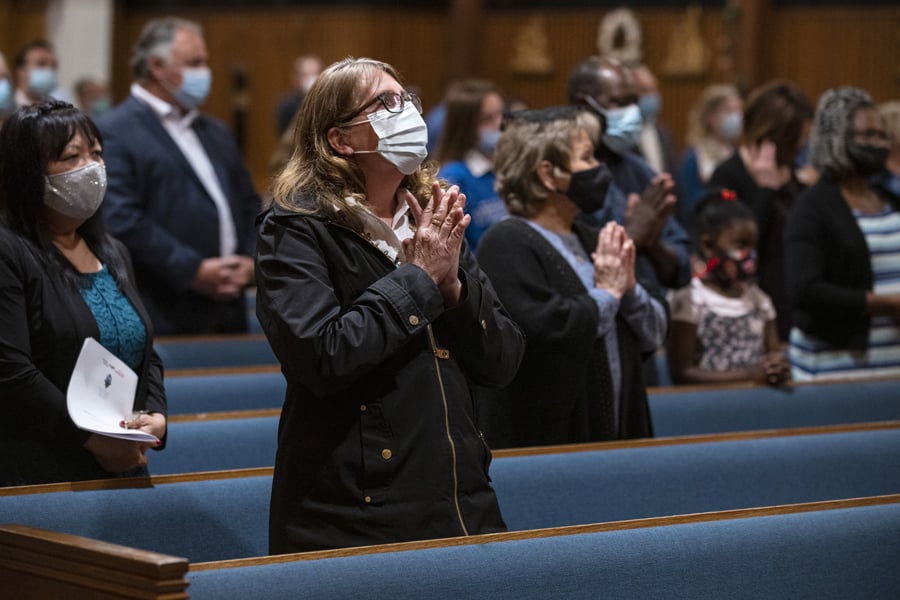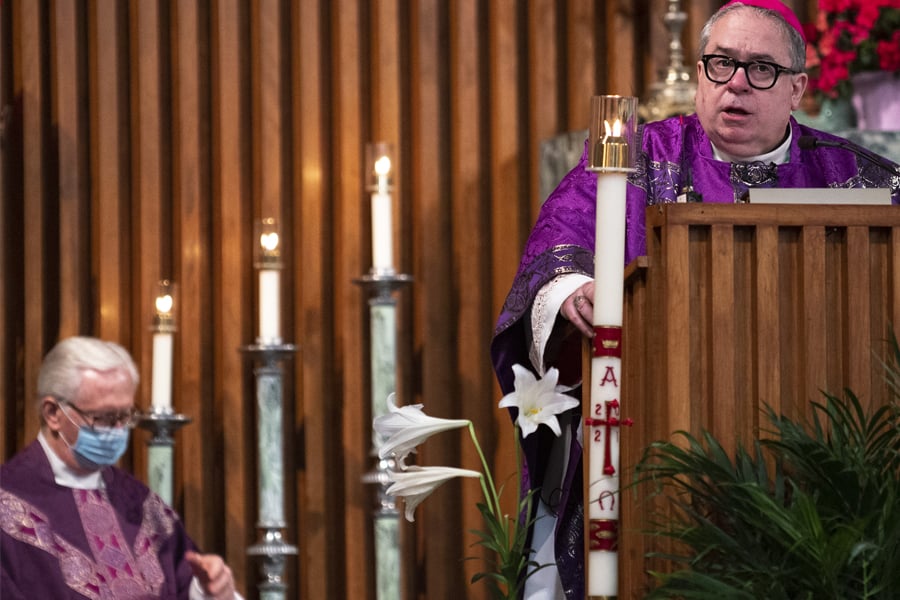Bishop Olson speaks of those on the periphery during Victims of Abuse Mass

Laura Mathews, left, prays during a special Mass for Child Abuse Prevention month at St. Maria Goretti Church in Arlington, on April 22, 2021. (NTC/Ben Torres)
ARLINGTON — Reflecting on Philip’s encounter with an Ethiopian eunuch in Acts 8:26-40, Bishop Michael Olson spoke of the duty all Christians have to minister to those on the periphery, the overlooked, and “all who have experienced the humiliation and denial of justice that sinful abuse brings about.”
Bishop Olson celebrated an April 22 in-person and livestreamed Mass of Reparation for Victims of Abuse at St. Maria Goretti Parish, one of several Diocese of Fort Worth events marking April as Child Abuse Prevention Month.
The offering of the Eucharist during the Mass, Bishop Olson said, was for the intention of “those who remain enslaved to the humiliation and woe of the sins of abuse.”
While it is our duty to reach out to such victims, it is equally important to remember where such calling and healing originate.
“This is the grace that only God and no one else can give so generously,” the bishop said. “And which we as disciples, deacons, servants, and Christians can only be willing and attentive instruments. We can never pretend to be the source of such healing power of God.”
It’s curious, Bishop Olson said, that Acts provides no name for the man Philip encountered, concluding that perhaps he represents all who have suffered abuse.
It’s a message St. Maria Goretti parishioner Kathy McCoy took to heart.
“What I got from the bishop’s message is that the only way we can have healing, whether it’s abuse or any other kind, is through Jesus Christ,” McCoy said.
Bishop Olson earlier in April spoke of the charge Catholics have to protect children and the vulnerable at risk, a charge that “can never be abandoned for an easier way.”

Bishop Michael Olson gives the homily during the Celebration of the Mass for Child Abuse Prevention month at St. Maria Goretti Church in Arlington, on April 22, 2021. (NTC/Ben Torres)
An estimated one in 10 children fall victim to sexual abuse before their 18th birthday, according to TexProtects, the Texas Association for the Protection of Children. More than four Texas children die from abuse or neglect each week on average, it states.
The COVID-19 pandemic likely aggravated those numbers, Diocesan Director of Safe Environment Sandra Schrader-Farry said.
“During a webinar with [Dr. Jamye Coffman of Cook Children’s Medical Center] we asked if they’ve seen an increase in abuse cases during the pandemic,” Schrader-Farry said. “She said reports are actually down.”
Reasons for the decrease in calls vary but in large part are credited to families quarantining and/or the fact that, with many schools closed last year, most children participated in at-home, distance learning.
“The idea is that, because of those factors, there are fewer external eyes, teachers and so forth, on our kiddos than before,” Schrader-Farry said. “So, we might assume that while the actual incidents of abuse are constant or even up, many of them are going unreported.”
Financial and other stressors tied to COVID-19 have also compounded the problems, she said.
“Many parents lost jobs,” Schrader-Farry said. “That brings financial stress, worries about health concerns. Many families who would otherwise be doing OK are now struggling, which can push people to the brink, or past it.
“You think of situations of child abuse or domestic violence where [during COVID] many families were stuck in the same home with less exposure to other people and the outside world.”
It’s important, Schrader-Farry said, to be mindful of not just child victims of physical, sexual, and emotional abuse but other vulnerable members of the population as well, such as abused adults, elderly, and victims of human trafficking.
To those ends the diocese employs multiple outreach efforts.
“First and foremost an educational component and to raise awareness,” Schrader-Farry said. “To help arm everyone with the right information on what to look for. To learn the signs and symptoms of what to look for so we can learn to protect the vulnerable. To stress that this is a problem everywhere. It’s not just overseas or somewhere else. Also, if you see something, what to do with that information and who and how to tell.”
Notifying law enforcement is crucial, Schrader-Farry said, adding that Safe Environment and other diocesan resources are also there to help.
In addition to the April 22 Mass, numerous presentations, activities, and educational outreach initiatives filled the month on a diocesan and parish level.
As always, prayer is of utmost importance.
“Absolutely,” Schrader-Farry said. “Both for abuse victims as well the rest of us in praying for the protection and well-being of our children and vulnerable among us.
“And for us as parents for guidance to effectively catechize, teach, and raise our children and keeping them protected. Prayer is also an important part of healing for victims who have suffered abuse of any sort.”
Editor’s note: The full text of Bishop Olson’s homily can be found here.
